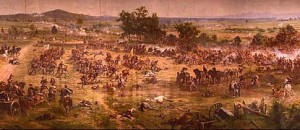Lincoln at Gettysburg: Spell-Binding
Why is it that schoolmarms (do people still use that word?) love teaching their pupils to memorize, or at least study, Abraham Lincoln’s Gettysburg address? How did it become a fundamental element of our culture? I’d wager that people are more likely to correctly complete the line, “Four-score and seven years ago…” than they are to know the name of any hero who fought on that battlefield.
Lincoln did more than eulogize the fallen soldiers at Gettysburg. He took his audience on a cyclical tour of national history and mission. His speech resembles the cyclorama exhibit at the battlefield today, in which viewers stand in the center of a fully-enclosed round mural of the battle, through which a tour guide retells Gettysburg’s stories. In Lincoln’s speech, aptly remembered as “The Gettysburg Address,” the audience returns to that battlefield, that pivotal point in our national history, and recalls the past, present, and future of the American adventure.
PAST: The speech opens with an elegant reference to the signing of the Declaration of Independence. Why not the signing of the Constitution? After all, the Civil War was about slavery and central government, Constitutional matters not mentioned in the Declaration. But Lincoln went beyond the war and recalled our founding principle of human equality. While the meaning of the Constitution and the Civil War would change over the years, the basic impulse of the nation toward equality would not.
This is also a matter of faith. The speech in general is very religious (even though G-d is not mentioned until the last sentence). Despite all questions of legal authority, we as a country believe that a Creator made all men equal, with the inalienable rights to life, liberty, and the pursuit of happiness. In order to re-dedicate the nation – standing, as it were, at Gettysburg – Lincoln returns to the country’s basic faith.
Present: With the national principle stated, Lincoln then proceeds to discuss the purpose of the gathering at Gettysburg. He returns his audience from the halls of Philadelphia to the great war engulfing the nation and the spilled blood still soaking into that solemn battlefield. Another blogger, Nick Morgan, points out that the speech powerfully repeats the rather simple word “here.” Lincoln also drives the location and the immediate objective home with his famous three-tiered line (another powerful repetition): “we cannot dedicate, we cannot consecrate, we cannot hallow this ground.” To stand where the heroes of Gettysburg stood, or even to recall the meaning of the Civil War, is truly an incredible burden.
Reading this part of the speech makes you wonder – like the viewer in the middle of the gore-infested cyclorama at Gettysburg – how we can possibly honor the heroes of this war? How can we be fit for that task?
Future: But then Lincoln finishes the speech with an astounding vision, a response to that feeling of impotence: we must dedicate ourselves to completing the task of those who’ve died fighting for our national faith in human equality. If we heed this message, we can ensure
“that these dead have not died in vain: that this nation under G-d shall have a new birth of freedom; and that the government by the people, for the people, shall not perish from the earth.”
This cyclorama type of speech lends Lincoln’s words the great gift of longevity, of retaining meaning even after the central point – the battlefield itself – has been largely forgotten. Gettysburg is no longer known for shifting the winds in the Civil War; it is known for the great re-dedication of our national faith that occurred in the wake of the battle.
Sources:
Connors, Tiffany. “How the Gettysburg Address Worked.” HowStuffWorks. http://history.howstuffworks.com/historical-events/gettysburg-address5.htm.
“The Gettysburg Cyclorama.” National Park Service. http://www.nps.gov/gett/historyculture/gettysburg-cyclorama.htm.
Morgan, Nick. “The Greatest 250-Word Speech Ever Written.” Public Words. April 15, 2009. http://publicwords.com/the-greatest-250word-speech-ever-written.
Zimmer, John. “The Gettysburg Address: An Analysis.” Manner of Speaking. November 19, 2010. http://mannerofspeaking.org/2010/11/19/the-gettysburg-address-an-analysis.

